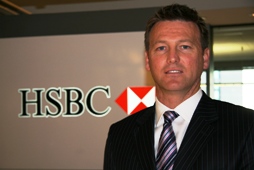HSBC could order 200,000 iPhones

update Global banking giant HSBC is considering ditching the BlackBerry and adopting Apple's iPhone as its standard staff mobile device, a move that could result in an order for some 200,000 iPhones.
"We are actually reviewing iPhones from a HSBC Group perspective ... and when I say that, I mean globally," HSBC's Australia and New Zealand chief information officer Brenton Hush told ZDNet.com.au yesterday.

HSBC A/NZ CIO Brenton Hush
HSBC has some 300,000 staff internationally. A decision to standardise on the iPhone on its corporate networks would likely lead to one of the world's largest iPhone orders.
"A decision on a piece of hardware like that would potentially be deployed, conservatively, to 200,000 people," said Hush. "You know, it's a big decision, especially when you have an existing fleet out there."
"But it's definitely something we are considering from a HSBC Group perspective," he said. "We always explore the potential application of new technologies and this is no different."
Should HSBC select the iPhone as its official corporate mobile device, the decision would be a major blow to Research in Motion, maker of the BlackBerry, which is HSBC's current standard staff mobile.
Most corporations passed on the iPhone when it was first released, due to limited availability and the device's lack of support for Microsoft's Exchange email platform. However, Apple has rectified both issues, and has additionally built a number of tools into the new iPhone 3G specifically targeted at corporate use.
HSBC's Australian presence is small compared to major Australian banks, but its global operations have a US$6 billion annual technology budget and a technology team of 30,000 supporting 300,000 employees.
Hush said he did not own an iPhone, however added, "I have obviously had hands on experience with them."
Heads of technology of other large organisations were cautious about the idea of standardising the iPhone for corporate network access at the time of its launch.
While one of Australia's big four banks, CommBank, today flagged its iPhone trading application as part of its $523 million growth strategy for the year, chief information officer Michael Harte recently expressed caution about the phone's introduction into its own networks.
Steven Bandrowczak, global CIO of Nortel, which has 30,000 staff, said he doubted whether his staff would choose the iPhone over its current device, the BlackBerry due to the latter device's superior email functionality.
However, Hush's opinion differed on this matter. ZDNet.com.au asked Hush whether he thought the BlackBerry had any advantage over the iPhone.
"No, I don't. I think [the iPhone] would change some underlying infrastructure considerations from an enterprise perspective. But [Apple] have been pretty smart with the design."
No time frame has been given for a decision on the iPhone move, with Hush adding that for his position located in Australia, the iPhone was a low-ranking priority at this stage.
The CIO, whose office is located at HSBC's Sydney headquarters on George Street, Sydney is just 500 metres away from Apple's new Sydney store, but he said he had not entered due to persistent queues.
"I'm blown away every time I walk past that Apple store, and there's always people queued up outside to get in," he said. "I haven't been in there. It's always too busy."